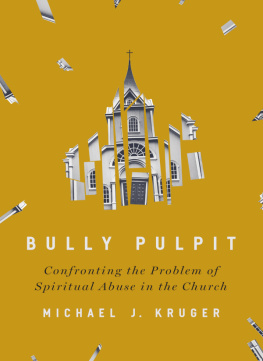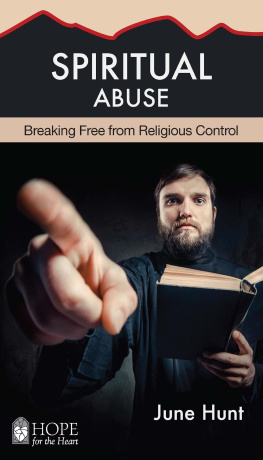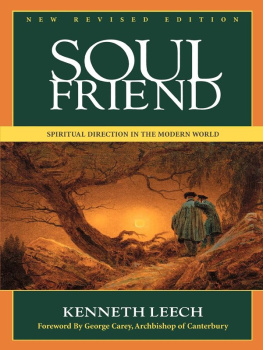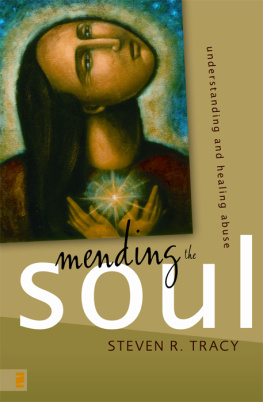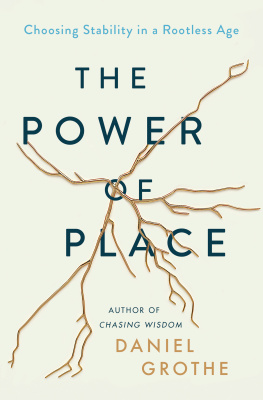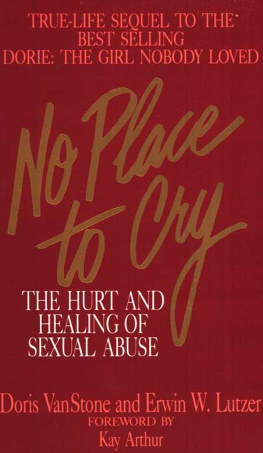KENNETH J. GARRETT
Foreword by Michael D. Langone
To the many who are torn down, worn down, and weakened by abusive pastors and the churches they control.
To the Seven: Amy, Emily, Jessica, Jennifer, Bryn, Rachel, and Shannon; bright Morning Stars of the MeToo reformation.
To the one who has fled a toxic church for the safety of the wilds; doubting, wishing, and wondering if his absence has been noticed by the One who is called a Good Shepherd.
To my dear Lord Jesus, who found mebroken, tattered and torn, picked me up, held me, and whispered my name in love.
Foreword
I n the early 1980s, when I was new to the cultic studies field, my colleagues at International Cultic Studies Association (ICSAthen known as American Family Foundation) and I were approached by national leaders of InterVarsity Christian Fellowship (IV). They were concerned that some of their campus evangelists were becoming too eager, cult-like even. They came to us, a secular psychological organization, because they realized the behaviors that troubled them were not the result of incorrect doctrine. One IV leader, analogizing to the trope of the gunslinger who puts a notch on his gun for every man he kills, said that some of their young people seemed to be putting a notch on their Bible for every soul they supposedly saved. The IV leaders knew that something was wrong. They knew the problem wasnt doctrine. They knew that some people approached by their IV evangelists accused them of being cultists. They hoped that cult specialists might help them better understand what was going on and how to fix it.
In our discussions with IV, it became clear that there were three common ways of defining cult . The public and media tended to view cult as connoting extreme deviance or weirdness. Religiously inclined persons tended to define a cult as a group that strays too far from orthodox doctrine, in essence a heresy. Mental health professionals who had worked with victims of groups accused of being cults put the emphasis on the use of manipulative, controlling, and coercive techniques of influence to induce a pseudo-conversion characterized by subservience to a leader.
The mental health view sees cultic behavior, what we may also call cultic dynamics, as an area on a continuum of influence going from respectful to manipulative to controlling. Depending upon the circumstances, one may reach an area on this continuum where the influence becomes unethical, where decent people of whatever faith say, That is wrong. People should not be treated like that.
Some people slide into unethical influence because of undisciplined enthusiasm. Their desire to reach an end is so strong that they employ means that, ironically, may be incompatible with the end they seek. This was the case with the IV campus evangelists. Their intentions were good, but the results of their actions were dubious or even harmful. These young evangelists lost sight of a central tenet of Christianity: God gave human beings the freedom to choose good or evil. Therefore, respecting the freedom of individualsthe freedom to say no to an evangelizing message, as well as yesis vital in all Christian interactions. Evangelists are witnesses to the gospel. They are not salesmen for Christ.
Other people may use unethical influence tactics because of a corrupt or sinful motive. A pastor, for example, may so desire that his church be successful (i.e., attract large numbers of people) that he employs promotional tactics that make used-car salesmen blush. This pastor may teach orthodox theology. He may be a sincere and devout Christian. He may say that he is a sinner like everybody else. But he is blind to the compulsive pride that causes his behavior to stray far from the path that Christians are supposed to walk.
Still other people may use unethical influence tactics with full awareness of what they are doing and why. These are the psychopaths and malignant narcissists who take advantage of trusting people seeking to improve the world or themselves. These wicked persons may be adept at playing the role of the holy man or woman. While in that role, they may temporarily convince themselves that they are that person. But when they have quiet time alone, they remember who they really are. Unlike Christians who awake to their sinful self-delusion, these con men and women feel no guilt. They believe they are entitled to the spoils their lies bring them because they are so much smarter than the people whom they view as witless fools inviting exploitation.
In my forty years working with victims of cultic groups, I have encountered thousands of peoplemost of above average intelligencewho have been harmed in the range of manipulative situations from which the three preceding examples are drawn. Approximately percent of those entering the ICSA network were harmed in religious groups. The other percent were harmed in cultic psychotherapies, political groups, new-age transformational trainings, commercial organizations, or families or dyads characterized by a cultic dynamic.
Using the term cult has sometimes impeded our work because the term means different things to different people. This has been especially true in the case of people leaving aberrant Christian groups or dysfunctional Christian relationships. Because these victims often conceptualize cult as heresy and because they have often been involved in what is ostensibly orthodox Christianity, they tend to ignore organizations that talk about cults.
These persons, however, will often respond to the concept of spiritual abuse. If one has been treated like an object to be manipulated, exploited, and discarded, even if one is only partly aware of the mistreatment, one inevitably feels abused. And if one feels this abuse deep in ones being, in ones soul, or if the abuse occurred in a religious setting, placing the adjective spiritual in front of abuse seems apt.
Because so many people entering the ICSA network come from aberrant Christian groups or relationships, we have developed resources that focus on spiritual abuse, most notably www.spiritualabuseresources.com. One section of this website deals with research, of which there is precious little.
A study by the late Rev. Dr. Richard Dowhower surveyed people, most of whom were former members of cultic groups. The most telling finding of this survey was that eighty respondents (%) sought help from mainline religious organizations. Thirty-two persons (%) found these services not at all helpful. Almost half of the former cult members entering our network sought help from churches, but percent of these help-seekers gave the churches the absolute lowest rating, not at all helpful. Churches need to be educated about spiritual abuse and cultic dynamics.
Another study that I conducted with the help of Rev. Robert Pardon, director of the New England Institute of Religious Research, surveyed four evangelical churches in southeastern Massachusetts. The total population of the four churches was about . Approximately percent of the congregants completed a survey that inquired into their experience of spiritual abuse. Here are the key findings pertinent to this discussion:
The most important question for this report is the number of people who believe they had been affiliated with a group, organization, or individual that you believe was spiritually abusive. Thirteen of the fifty-five respondents ( percent) said yes; four of the thirteen said the abuse had occurred in a mainstream church denomination.



